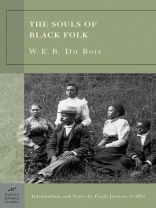The Souls of Black Folk, by
W. E. B. Du Bois ,
is part of the
Barnes & Noble Classics
series, which offers quality editions at affordable prices to the student and the general reader, including new scholarship, thoughtful design, and pages of carefully crafted extras. Here are some of the remarkable features of
Barnes & Noble Classics:
- New introductions commissioned from todays top writers and scholars
- Biographies of the authors
- Chronologies of contemporary historical, biographical, and cultural events
- Footnotes and endnotes
- Selective discussions of imitations, parodies, poems, books, plays, paintings, operas, statuary, and films inspired by the work
- Comments by other famous authors
- Study questions to challenge the readers viewpoints and expectations
- Bibliographies for further reading
- Indices & Glossaries, when appropriate
Barnes & Noble Classics pulls together a constellation of influences—biographical, historical, and literary—to enrich each readers understanding of these enduring works.
One of the most influential books ever published in America, W. E. B. Du Bois ’s The Souls of Black Folk is an eloquent collection of fourteen essays that describe the life, the ambitions, the struggles, and the passions of African Americans at the transition from the nineteenth to the twentieth century.
The first African American to receive a Ph.D. from Harvard University, Du Bois was a sociologist, historian, novelist, and activist whose astounding career spanned the nation’s history from Reconstruction to the Civil Rights Movement. In The Souls of Black Folk, published in 1903, Du Bois argued against the conciliatory position taken by Booker T. Washington, at the time the most influential black leader in America, and called for a more radical form of aggressive protest—a strategy that would anticipate and inspire much of the activism of the 1960s.
Du Bois’s essays were the first to articulate many of Black America’s thoughts and feelings, including the dilemma posed by the black psyche’s “double consciousness, ” which Du Bois described as “this twoness—an American, a Negro; two souls, two thoughts, two unreconciled strivings . . . in one dark body.” Every essay in The Souls of Black Folk is a jewel of intellectual prowess, eloquent language, and groundbreaking insight. It is essential reading for anyone interested in the struggle for Civil Rights in America.
Farah Jasmine Griffin is Professor of English and Comparative Literature and African-American Studies at Columbia University in New York City.
Об авторе
William Edward Burghardt Du Bois (1868 –1963) was an American sociologist, socialist, historian and Pan-Africanist civil rights activist. Born in Massachusetts, Du Bois completed graduate work at the University of Berlin and Harvard, where he was the first African American to earn a doctorate. A professor of history, sociology and economics at Atlanta University, Du Bois was one of the founders of the National Association for the Advancement of Colored People (NAACP) in 1909.












